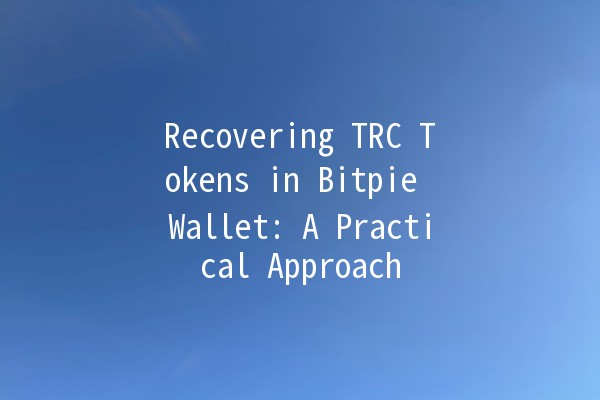
In the fastevolving world of cryptocurrency, maintaining the security and accessibility of digital assets is paramount. For users of Bitpie Wallet, especially for those managing TRC tokens (TRC10 and TRC20), having a solid understanding of recovery processes can be a game changer. This article delves into practical techniques for effectively recovering TRC tokens stored in Bitpie Wallet, ensuring you have the tools to safeguard your investments.
Understanding TRC Tokens and Bitpie Wallet

What Are TRC Tokens?
TRC tokens are blockchainbased assets built on the TRON network. They can be used for various purposes, including staking, trading, or as part of decentralized applications (dApps). There are two main types of TRC tokens:
TRC10 Tokens: These are native tokens that can be created freely without any complex smart contracts.
TRC20 Tokens: These tokens follow a specific standard that necessitates developers to create and deploy smart contracts.
to Bitpie Wallet
Bitpie Wallet is a versatile digital wallet that supports multiple cryptocurrencies, including TRC tokens. It offers features such as multisignature security, asset management, and an inbuilt exchange function. Despite its robust security measures, users may face scenarios where they need to recover their TRC tokens.
Five Effective Techniques for TRC Token Recovery
Explanation
The first step towards ensuring the safety of your TRC tokens is to back up your wallet regularly. This includes saving your mnemonic phrase and private keys securely.
Application Example
Mnemonic Phrase: This is a series of words generated upon wallet creation. Store this phrase in a secure location, such as a password manager or a physical safe, rather than a digital format that may be prone to hacking.
Private Keys: Similar to a password, these keys are vital for access. Print them out or write them down and keep them separate from your electronic devices.
Explanation
If your Bitpie Wallet is on a different device or if you’ve mistakenly uninstalled the application, you can recover it using the import function.
Application Example
Navigate to the Bitpie Wallet’s main screen, select the “Import Wallet” option, and input your mnemonic phrase or private keys to restore access to your wallet and TRC tokens quickly.
Explanation
Sometimes users may think they have lost their tokens when they are merely in an unconfirmed transaction state. It's crucial to monitor these transactions.
Application Example
Utilize TRON's block explorer (like Tronscan) to check the status of pending transactions. Input your wallet address to verify if your funds are still in the process of being transferred and ensure they aren't lost.
Explanation
If challenges persist, reaching out to Bitpie Wallet's customer support can provide additional pathways to recovery.
Application Example
Contact customer service through their official channels and provide necessary details such as your wallet address and transaction IDs. They can guide you through recovery options tailored to your specific situation.
Explanation
If you can't access your Bitpie Wallet, utilizing your recovery seed phrase in another wallet that supports TRC tokens can be a valid solution.
Application Example
Import your mnemonic phrase into an alternative wallet like TronLink or Trust Wallet to access and manage your TRC tokens as a temporary measure while resolving issues with Bitpie.
Frequently Asked Questions
Losing your mnemonic phrase can be distressing, as it is the only way to recover your wallet. Unfortunately, without it, accessing your TRC tokens is virtually impossible. This reinforces the importance of securely backing it up in multiple locations.
To enhance wallet security, use twofactor authentication if available, regularly update the wallet application, and be cautious about sharing information online. Avoid public WiFi when accessing your wallet to minimize security risks.
If you mistakenly send tokens to an incorrect address, recovery is generally not possible. It is crucial to doublecheck recipient addresses before initiating any transfers to avoid irreversible losses.
Ideally, you should back up your wallet whenever you make significant transactions or changes. If you frequently add or withdraw funds, ensure a backup exists before each crucial action to mitigate potential losses.
Typically, recovery processes within Bitpie should not incur fees. However, if you switch to another wallet for recovery, be aware that network transaction fees may apply when sending tokens.
If your wallet is compromised, immediate action is crucial. First, transfer all accessible assets to a new secure wallet using your mnemonic phrase. Unfortunately, tokens already moved by an unauthorized party cannot typically be recovered.
Navigating the world of cryptocurrency can be daunting, particularly regarding asset recovery. However, by adopting practical techniques such as regular backups, utilizing support channels, and actively monitoring transactions, users can enhance their confidence in managing TRC tokens within Bitpie Wallet. Being proactive and informed are key strategies for ensuring your digital assets remain secure and accessible in this everevolving landscape of cryptocurrencies.

